Introduction
In the rapidly evolving landscape of technology, organizations are increasingly turning to Google Managed Services as a strategic solution to enhance their operational capabilities. These services offer a comprehensive suite of tools and expert support that not only streamline IT management but also foster innovation and drive efficiency. By partnering with Google, businesses can alleviate the complexities of IT infrastructure, allowing them to focus on their core competencies while benefiting from advanced technologies and robust security measures.
As the demand for cloud services continues to surge, particularly in the U.S. and Western Europe, understanding the advantages of Google Managed Services becomes essential for organizations aiming to thrive in a competitive market. This article delves into the multifaceted benefits of these services, highlighting their role in:
- Cost management
- Operational efficiency
- Security
- The cultivation of a culture of innovation
Unlocking the Advantages of Google Managed Services
Managed Services offer a powerful set of tools and support aimed at substantially enhancing a company's operational capabilities. By utilizing these services, organizations can achieve greater scalability and harness advanced technologies while alleviating the complexities associated with IT management. This strategic partnership allows organizations to concentrate on their core competencies, leaving intricate IT challenges in the hands of external expertise.
Furthermore, Google's extensive global infrastructure guarantees high availability and optimal performance, essential for navigating the demands of today's dynamic commercial landscape. As highlighted by research expert Lionel Sujay Vailshery, leveraging these solutions can lead to transformative operational efficiencies that enable organizations to thrive in a competitive market. Significantly, to elevate a business to over $250 million in annual recurring revenue (ARR), a channel/partnerships revenue share of 25% is likely required, highlighting the significance of strategic partnerships in utilizing managed offerings.
Additionally, the dominance of the U.S. and Western Europe in the cloud computing market, accounting for 82% of global adoption, highlights the significance of Managed Services in leading cloud markets. These services cater to various industries, including:
- Finance
- Government
- Healthcare
- Retail
- Manufacturing
Focusing on specific needs such as cybersecurity and supply chain management.
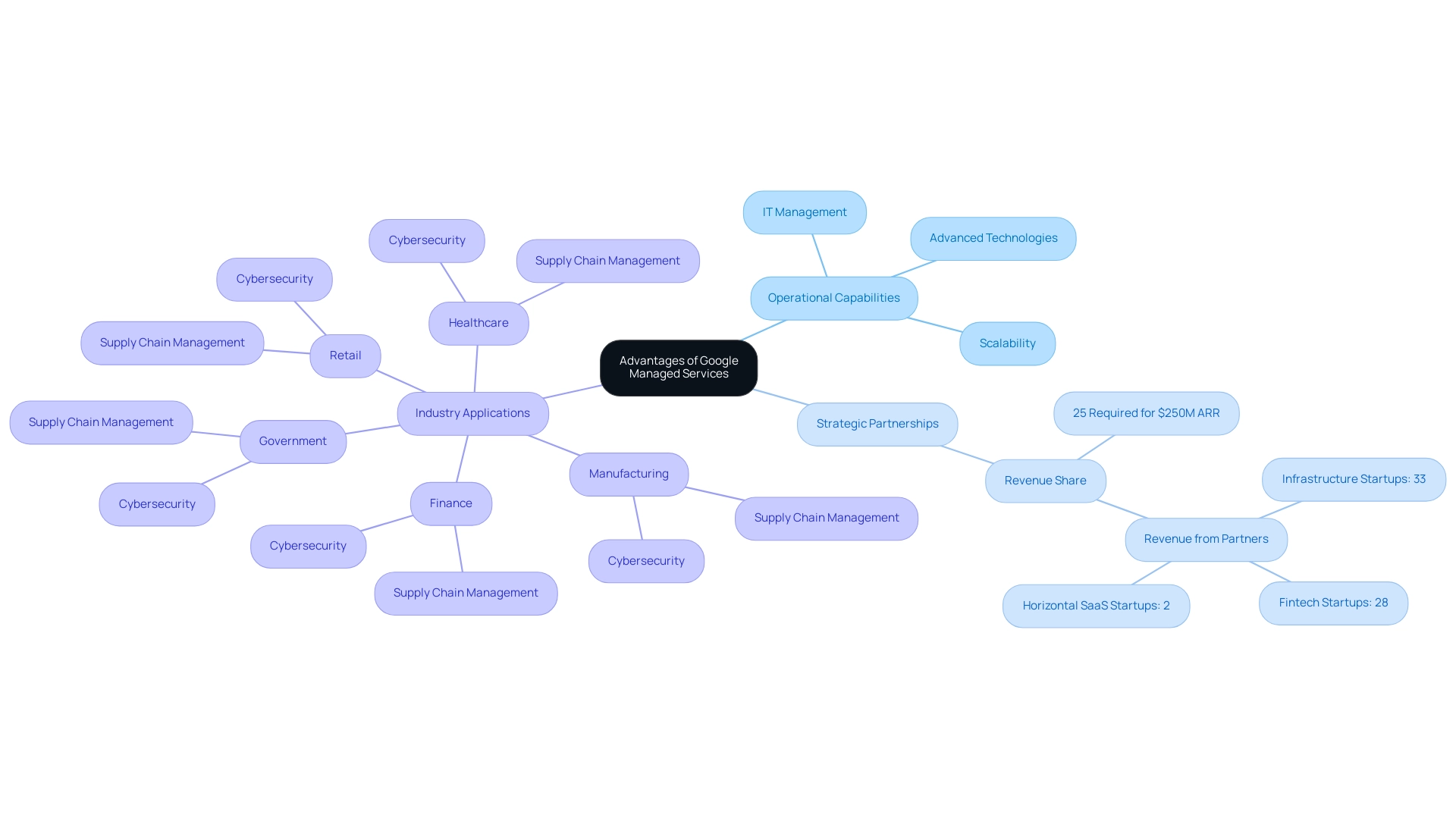
Enhancing Security and Compliance with Google Managed Services
An array of robust security features essential for protecting sensitive data and ensuring compliance with regulatory standards is offered by Google Managed Services. With built-in protocols such as encryption, identity management, and continuous monitoring, organizations can effectively mitigate risks associated with data breaches. Alarmingly, recent findings reveal that 46% of IT leaders acknowledge external threats, particularly from hackers, as the most significant risk to their cloud data.
Moreover, 35% of security teams report inadequate visibility and control within the development process, highlighting a critical area where Google Managed Services can provide substantial support. Furthermore, a substantial 72% of security professionals highlight underlying infrastructure compromise as a key concern, underscoring the necessity for resilient security frameworks. The historical perspective on data breaches, as illustrated in the case study 'The Origin of Data Breaches,' emphasizes that these issues have persisted since the 1980s, necessitating continuous improvement in protective measures.
The company's unwavering commitment to complying with various industry regulations, including GDPR and HIPAA, enables businesses to navigate the complex landscape of data protection, ensuring they meet essential legal requirements while fully leveraging cloud technologies. As noted by IBM, entities leveraging Managed Security Service Providers (MSSPs) benefit from a 21% reduction in breach lifecycle duration, further illustrating the effectiveness of these comprehensive security measures.
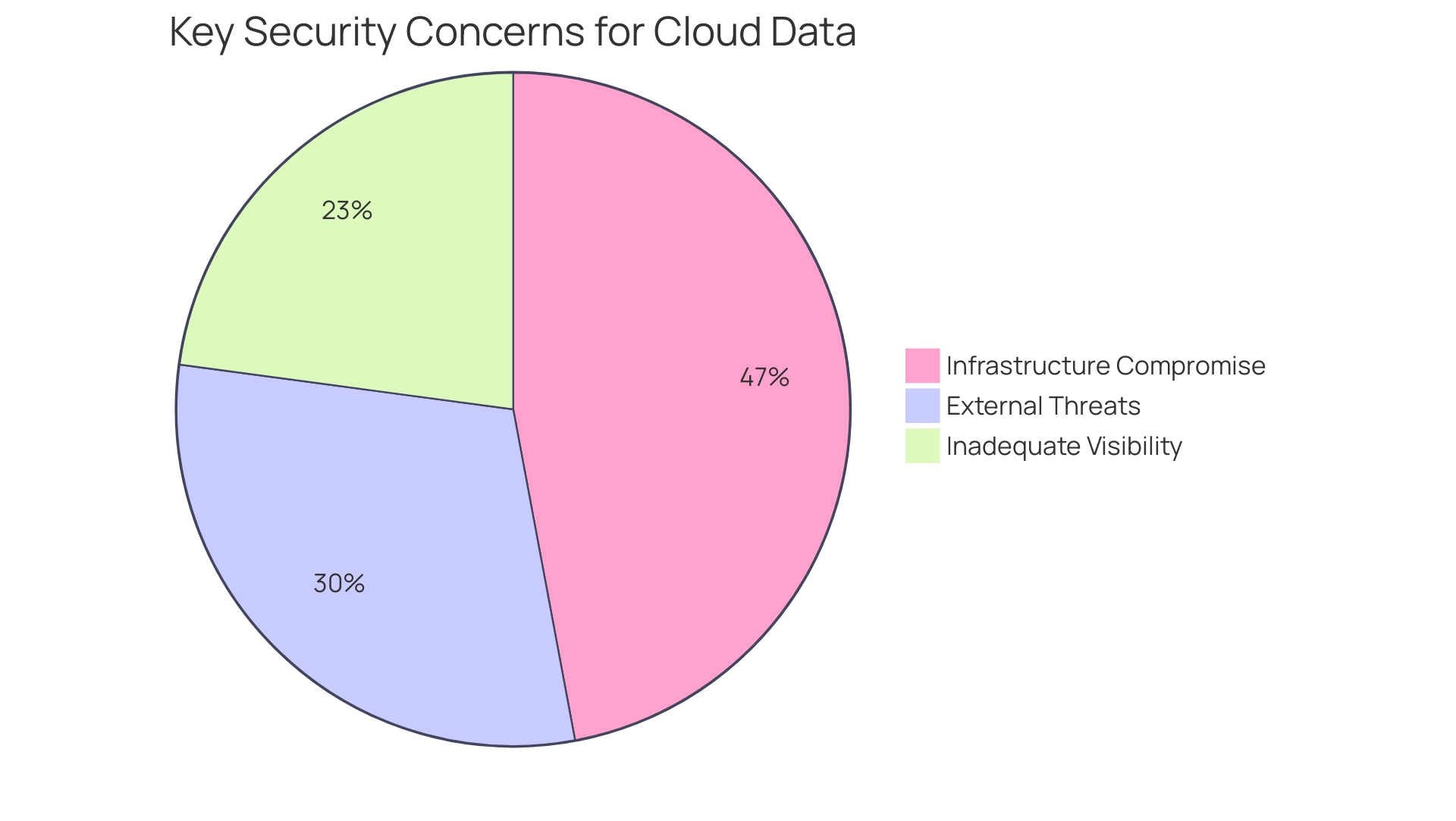
Achieving Operational Efficiency through Managed Services
Delegating IT management to the tech giant provides entities with exceptional operational efficiencies. The automation capabilities of Google managed services not only streamline routine tasks but also reduce the reliance on extensive in-house IT resources. This strategic approach offers entities access to expert support precisely when needed, resulting in significantly quicker response times to IT issues.
Consequently, internal teams are liberated to concentrate on strategic initiatives rather than the daily grind of IT operations. This shift in focus leads to enhanced productivity and the optimization of workflows. Significantly, recent data shows that 50% of companies are already outsourcing IT help desk functions to enhance productivity, highlighting the increasing trend towards operational efficiency.
In the financial industry, 72% of organizations are outsourcing app development, further highlighting the widespread move towards leveraging external expertise. With the web hosting outsourcing revenue projected to soar from $159 billion to $355 billion by 2029, it's evident that more companies are recognizing the benefits of such collaborations. As illustrated in the case study titled 'Global Outsourcing Trends,' enhanced global connectivity allows companies to leverage skilled, low-cost labor overseas, helping them cut costs and streamline operations.
Moreover, Forrester Research accurately observed that the worldwide market for hardware upkeep and IT outsourcing is expected to hit $503 billion, indicating a growing dependence on Google managed services to foster improved organizational results.
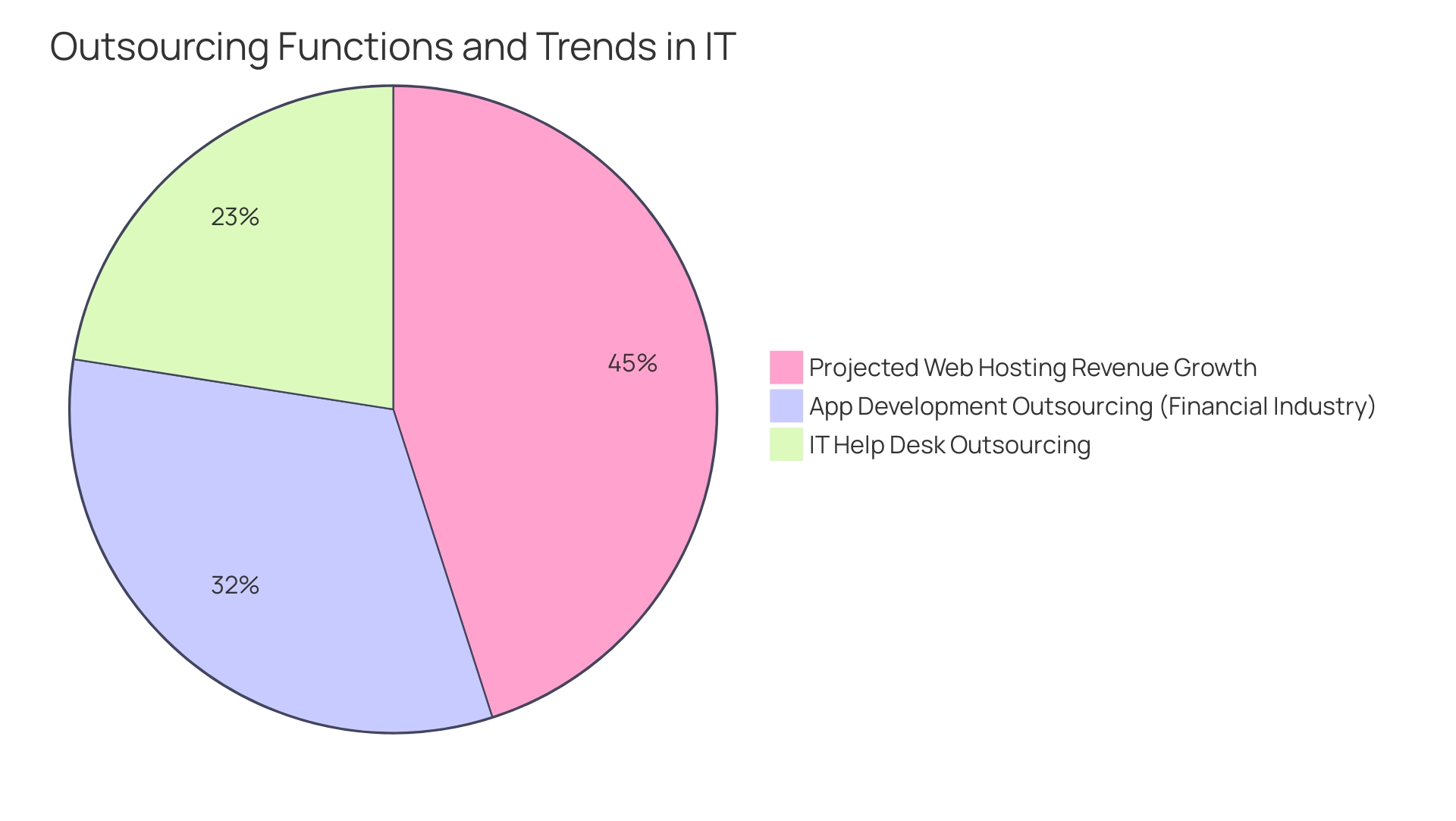
Fostering Innovation and Strategic Focus with Google Managed Services
Google Managed Services foster organizational innovation by providing access to advanced technologies and specialized expertise. By easing businesses of the complexities linked to IT management, these solutions enable companies to direct their resources into the creation of new products and offerings, significantly improving customer experiences and investigating untapped market opportunities. The rapid adoption and integration of transformative technologies, such as artificial intelligence and machine learning, position organizations to maintain a competitive edge and swiftly respond to evolving market demands.
In fact, industry forecasts from IDC indicate that by 2024, the managed sector will see an upsurge in large contracts, with over 200 anticipated deals each exceeding $100 million. This trend reflects a growing acknowledgment of the importance of managed solutions in facilitating innovation, as evidenced by IBM's acquisition of Taos and Accenture's acquisition of Linkbynet to enhance their cloud capabilities. Additionally, managed providers (MSPs) cater to various industries, including finance, healthcare, retail, and manufacturing, focusing on specific needs like cybersecurity and supply chain management.
As Sean Blanton, Director of Content at JumpCloud, observes,
The landscape of technology adoption is continuously evolving, and entities utilizing Managed Services are at the forefront of this transformation.
By adopting Google Managed Services, businesses can nurture a culture of continuous innovation and harness the potential of cutting-edge technologies.
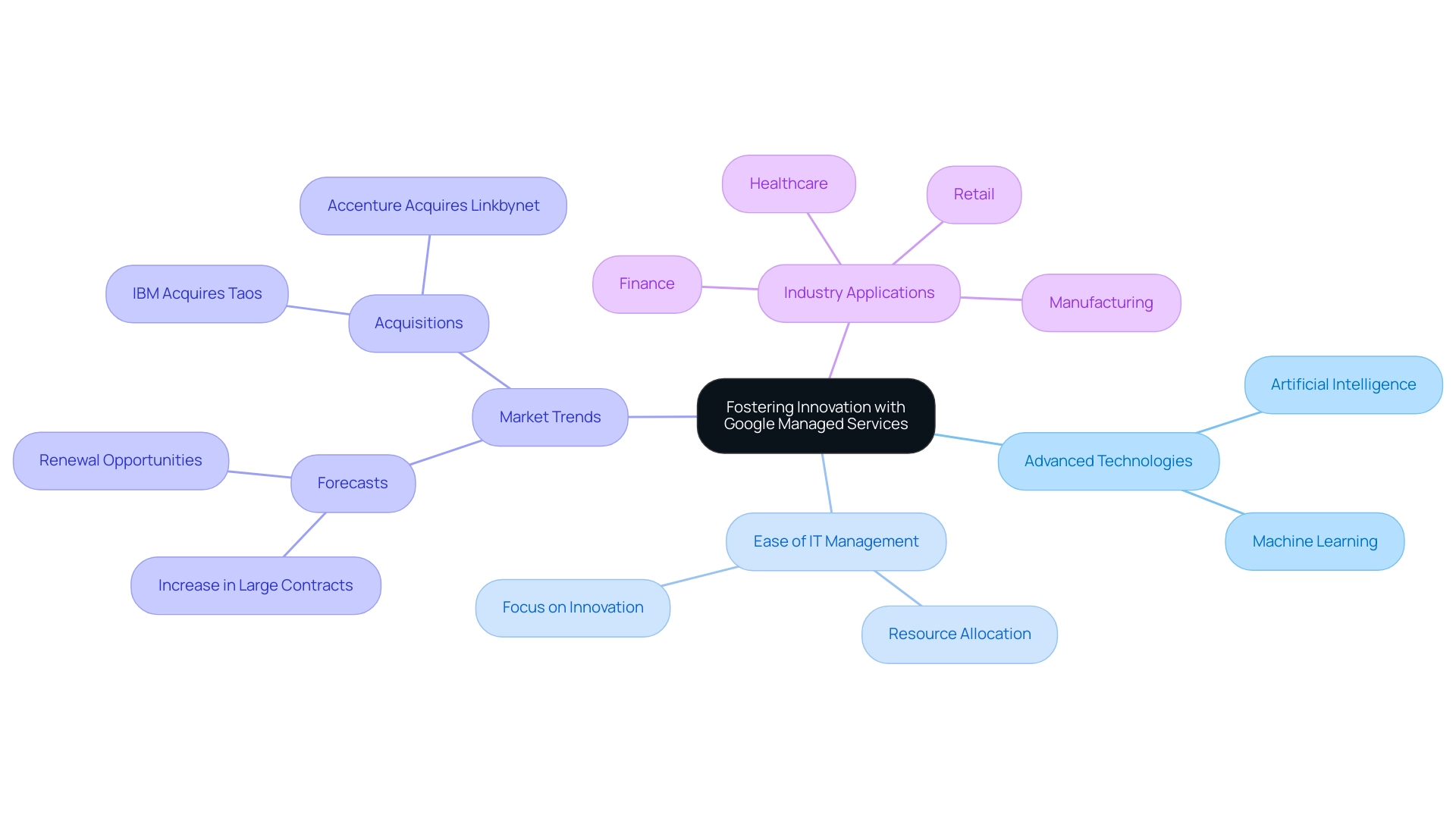
Cost Management and Resource Optimization through Google Managed Services
Utilizing Managed Services can yield substantial financial benefits for organizations, primarily through significant cost savings. Shifting to a managed model reduces the strain of maintaining in-house IT infrastructure, which frequently results in significant overhead costs. The pay-as-you-go pricing model empowers businesses to scale their technological usage according to specific needs, effectively eliminating wasteful expenditures.
Moreover, the strategic optimization of resources through managed solutions ensures that entities only pay for what they truly use, improving overall financial efficiency and enabling better budget management. Notably, the U.S. and Western Europe account for 82% of the world's cloud computing market, highlighting the importance of Google Managed Services in these key regions. Recent reports indicate that organizations using these offerings can achieve remarkable cost reductions; for instance:
- Drift successfully trimmed its annual cloud costs by $2.4 million.
- Applause reported a 23% decrease in cloud spending.
Furthermore, the misconfiguration of cloud platforms is the primary reason for cloud-based data breaches, emphasizing the significance of managed solutions in reducing such risks. The growth of Workspace in the retail sector, with a 40% increase in user base over the past year, further emphasizes the rising adoption of these services and the potential for cost savings and efficiency improvements in that sector. As noted by RedBlink Technologies,
Discover how our dedicated professionals can help you optimize your cloud spending, enhance operational efficiencies, and significantly improve your return on investment.
This evidence reinforces the notion that leveraging Google Managed Services streamlines operational costs and contributes to long-term financial sustainability.
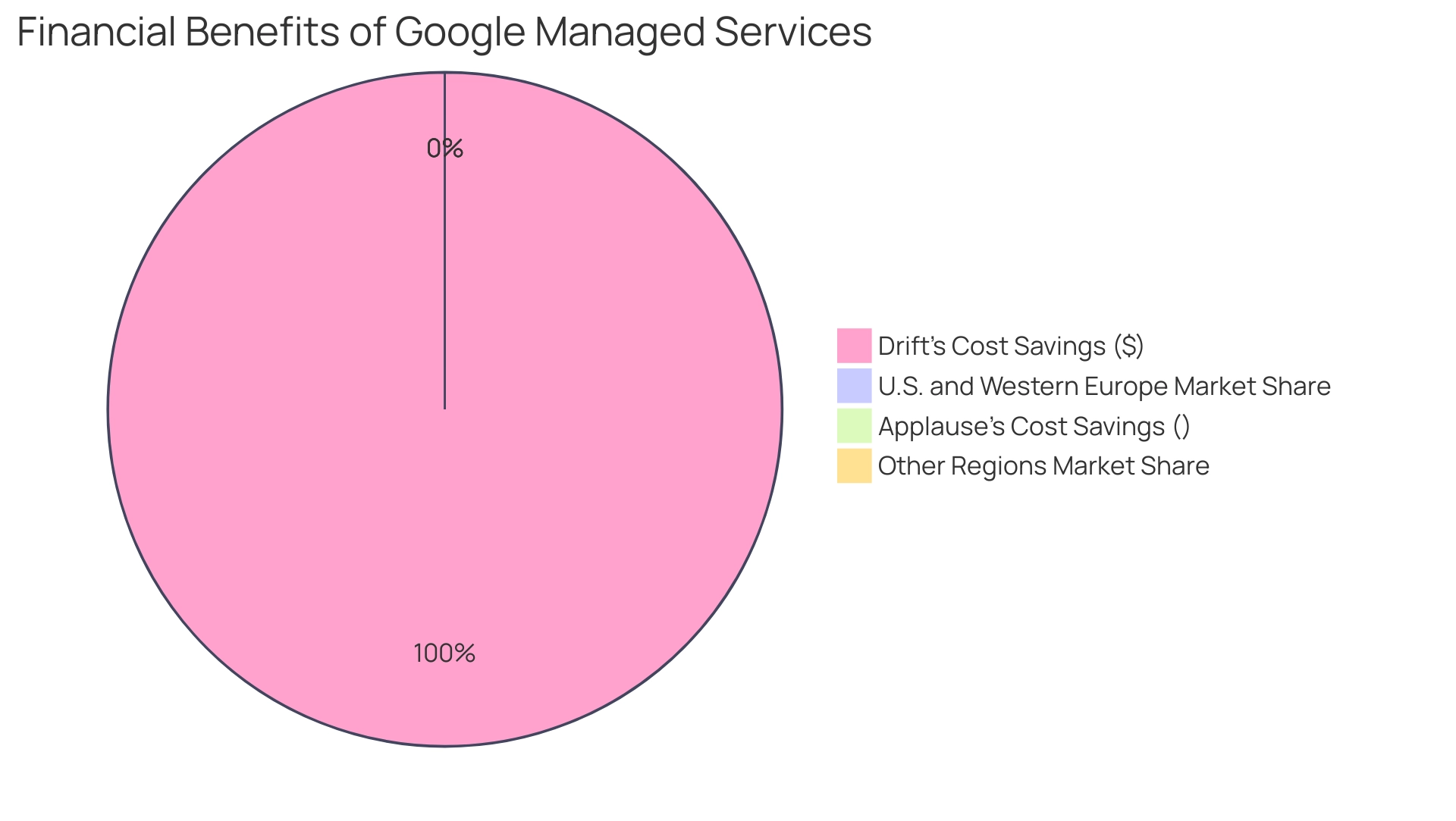
Conclusion
The advantages of Google Managed Services are clear and compelling, offering organizations a strategic pathway to enhance their operational capabilities while navigating the complexities of IT management. By leveraging these services, businesses can achieve greater scalability, optimize costs, and ensure robust security measures that protect sensitive data. The emphasis on operational efficiency allows internal teams to focus on strategic initiatives, thus fostering a culture of innovation and responsiveness in a competitive landscape.
Moreover, the financial benefits of adopting Google Managed Services cannot be overstated. Through a pay-as-you-go pricing model and resource optimization, organizations can significantly reduce overhead costs while enhancing budget management. The successful case studies of companies like Drift and Applause highlight the tangible financial gains that can be realized, further underscoring the value of these services.
In conclusion, as the demand for cloud solutions continues to rise, embracing Google Managed Services is not merely a choice but a necessity for organizations aiming to thrive in today’s dynamic market. By integrating these services, businesses position themselves at the forefront of technological advancement, ensuring they are well-equipped to meet future challenges and capitalize on emerging opportunities.




